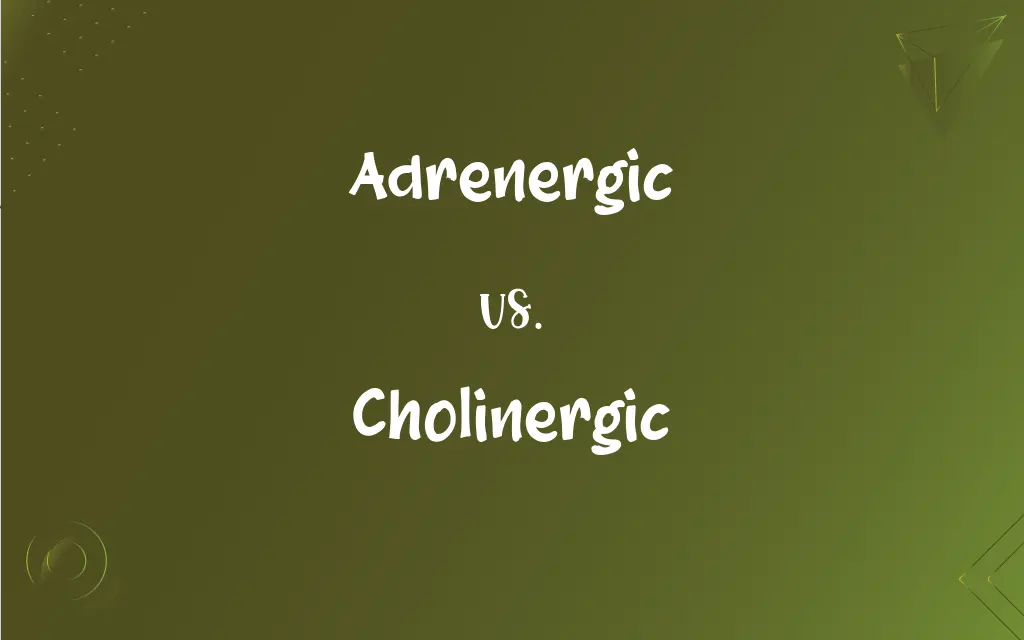Adrenergic vs. Cholinergic: What's the Difference?
Edited by Harlon Moss || By Janet White || Published on October 25, 2023
Adrenergic pertains to adrenaline and its effects; Cholinergic relates to acetylcholine and its actions.

Key Differences
Adrenergic and Cholinergic are terms that describe the actions, receptors, and pathways of two distinct neurotransmitters: adrenaline (and noradrenaline) and acetylcholine, respectively. These neurotransmitters play crucial roles in the body's physiological functions.
Adrenergic systems, often associated with the "fight or flight" response, are activated by the neurotransmitters adrenaline and noradrenaline. The release of these neurotransmitters results in increased heart rate, pupil dilation, and other related responses.
In contrast, the Cholinergic systems are mainly related to the "rest and digest" response. They involve the neurotransmitter acetylcholine. The release of acetylcholine typically results in decreased heart rate, stimulation of digestive processes, and pupil constriction.
While Adrenergic receptors, like alpha and beta receptors, respond to adrenaline and noradrenaline, Cholinergic receptors, like muscarinic and nicotinic receptors, are specifically activated by acetylcholine.
To sum it up, while both Adrenergic and Cholinergic pathways play essential roles in bodily functions, Adrenergic pathways often prepare the body for action, and Cholinergic pathways are more associated with relaxation and digestion.
ADVERTISEMENT
Comparison Chart
Associated Neurotransmitters
Adrenaline, Noradrenaline
Acetylcholine
Primary Response Type
"Fight or Flight"
"Rest and Digest"
Receptor Types
Alpha, Beta
Muscarinic, Nicotinic
Typical Effects
Increased heart rate, pupil dilation
Decreased heart rate, digestive stimulation, pupil constriction
Role in Body
Prepares body for action
Associated with relaxation and digestion
ADVERTISEMENT
Adrenergic and Cholinergic Definitions
Adrenergic
Adrenergic pathways influence heart rate and blood pressure.
Adrenergic drugs can elevate blood pressure by stimulating these pathways.
Cholinergic
Cholinergic is associated with the "rest and digest" function.
Cholinergic activity promotes digestion after a meal.
Adrenergic
Adrenergic denotes receptors targeted by adrenaline.
Beta-blockers inhibit specific adrenergic receptors.
Cholinergic
Cholinergic refers to nerve cells releasing acetylcholine.
The parasympathetic nervous system has cholinergic neurons.
Adrenergic
Adrenergic refers to nerves releasing noradrenaline or adrenaline.
The sympathetic nervous system contains adrenergic neurons.
Cholinergic
Cholinergic systems play roles in memory and learning.
Dysfunction in cholinergic pathways is linked to Alzheimer's disease.
Adrenergic
Adrenergic is associated with the "fight or flight" response.
In stress, adrenergic activity increases preparing the body to react.
Cholinergic
Cholinergic pertains to the actions of acetylcholine.
Cholinergic pathways help regulate heart rhythm.
Adrenergic
Activated by or capable of releasing epinephrine or a similar substance, especially in the sympathetic nervous system
Adrenergic receptors.
Cholinergic
Cholinergic denotes receptors activated by acetylcholine.
Muscarinic receptors are a type of cholinergic receptor.
Adrenergic
Having physiological effects similar to those of epinephrine
An adrenergic amine.
Cholinergic
Activated by or capable of liberating acetylcholine, especially in the parasympathetic nervous system.
Adrenergic
Having the quality of adrenaline or epinephrine.
Cholinergic
Having physiological effects similar to those of acetylcholine
A cholinergic agent or drug.
Adrenergic
Containing or releasing adrenaline.
Cholinergic
(biochemistry) Of, pertaining to, activated by, producing or having the same function as acetylcholine.
Adrenergic
Activated by an adrenal mechanism
Cholinergic
(biochemistry) Any drug or substance producing or having the same function as acetylcholine.
Adrenergic
Any adrenergic compound
Cholinergic
Releasing or activated by acetylcholine or a related compound
Adrenergic
Producing or activated by epinephrine or adrenaline
Adrenergic
Drug that has the effects of epinephrine
Adrenergic
Relating to epinephrine (its release or action)
Adrenergic
Adrenergic relates to the actions of adrenaline.
The patient's adrenergic response caused a rapid heartbeat.
FAQs
Are beta receptors Adrenergic or Cholinergic?
Beta receptors are Adrenergic.
Can Adrenergic activity affect blood pressure?
Yes, increased adrenergic activity can elevate blood pressure.
Which system is more involved in memory, Adrenergic or Cholinergic?
The Cholinergic system plays a more significant role in memory functions.
What neurotransmitter is associated with Adrenergic systems?
Adrenergic systems are associated with adrenaline and noradrenaline.
What primary response is Cholinergic related to?
Cholinergic is primarily related to the "rest and digest" response.
What are common Cholinergic receptors?
Muscarinic and nicotinic receptors are common cholinergic receptors.
What happens during an Adrenergic response?
An Adrenergic response typically prepares the body for action, causing effects like increased heart rate.
What role does acetylcholine play in the Cholinergic system?
Acetylcholine is the primary neurotransmitter in the Cholinergic system.
Are Adrenergic receptors found in the heart?
Yes, Adrenergic receptors, especially beta receptors, are found in the heart.
Are there drugs that target Cholinergic receptors?
Yes, drugs like anticholinergics and cholinesterase inhibitors target Cholinergic receptors.
About Author
Written by
Janet WhiteJanet White has been an esteemed writer and blogger for Difference Wiki. Holding a Master's degree in Science and Medical Journalism from the prestigious Boston University, she has consistently demonstrated her expertise and passion for her field. When she's not immersed in her work, Janet relishes her time exercising, delving into a good book, and cherishing moments with friends and family.
Edited by
Harlon MossHarlon is a seasoned quality moderator and accomplished content writer for Difference Wiki. An alumnus of the prestigious University of California, he earned his degree in Computer Science. Leveraging his academic background, Harlon brings a meticulous and informed perspective to his work, ensuring content accuracy and excellence.































































